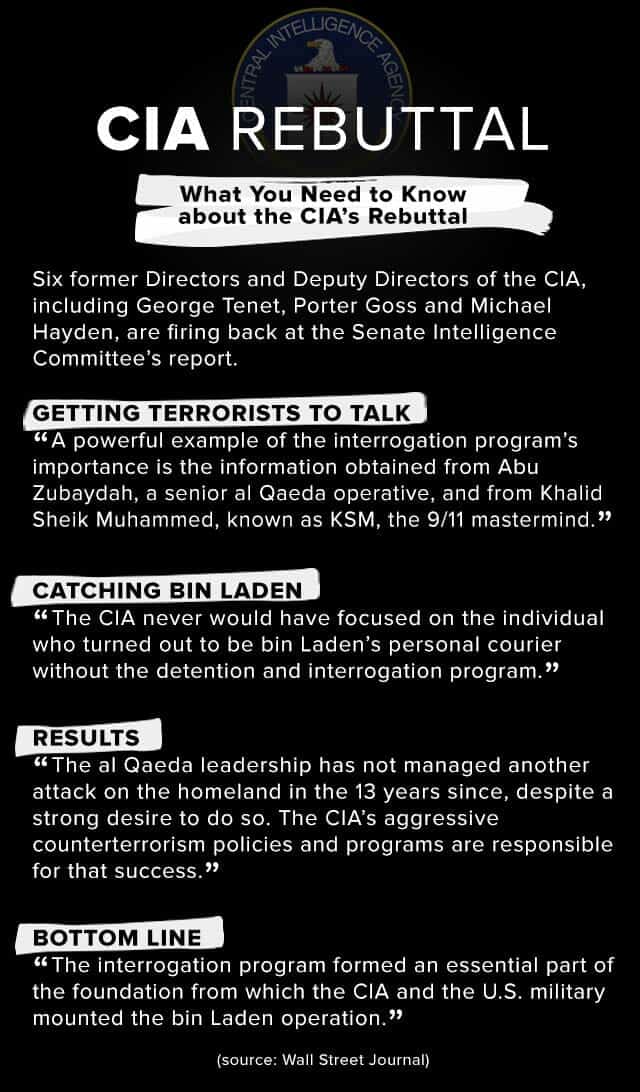(ABC) Six former Directors and Deputy Directors of the CIA fired back at the Senate Intelligence Committee with a vehemence almost never seen in the intelligence world.
The former CIA leaders — including George Tenet, Porter Goss and Michael Hayden — blasted the Senate report as “one-sided and marred with errors” and called it “a poorly done and partisan attack on the agency that has done the most to protect America after the 9/11 attacks.”
Their 2,500-word rebuttal was posted as an op-ed on the Wall Street Journal website once the report was released. The former intel chiefs are also launching their own website to respond to the attacks on CIA’s post-9/11 activities.
Via CIA Saves Lives website:
….We, as former senior officers of the Central Intelligence Agency, created this website to present documents that conclusively demonstrate that the program was: authorized by the President, overseen by the National Security Council, and deemed legal by the Attorney General of the United States on multiple occasions. None of those officials were interviewed either. None. CIA relied on their policy and legal judgments. We deceived no one. You will not find this truth in the Majority Report.
Absent from the report is any discussion of the context the United States faced after 9/11. This was a time we had solid evidence that al Qaida was planning a second wave of attacks against the U.S.; we had certain knowledge that bin Laden had met with Pakistani nuclear scientists and wanted nuclear weapons; we had reports that nuclear weapons were being smuggled into New York City; and we had hard evidence that al Qaida was trying to manufacture anthrax. It felt like a “ticking time bomb” every single day.
In this atmosphere, time was of the essence. We had a deep responsibility to do everything within the law to stop another attack. We clearly understood that, even with legal and policy approvals, our decisions would be questioned years later. But we also understood that we would be morally culpable for the deaths of fellow citizens if we failed to gain information that could stop the next attacks.
The report defies credulity by saying that the interrogation program did not produce any intelligence value. In fact, the program led to the capture of senior al Qaida leaders, including helping to find Usama bin Ladin, and resulted in operations that led to the disruption of terrorist plots that saved thousands of American and allied lives…
This from the Wall Street Journal in regards to that last emphasized sentence:
…First, its claim that the CIA’s interrogation program was ineffective in producing intelligence that helped us disrupt, capture, or kill terrorists is just not accurate. The program was invaluable in three critical ways:
• It led to the capture of senior al Qaeda operatives, thereby removing them from the battlefield.
• It led to the disruption of terrorist plots and prevented mass casualty attacks, saving American and Allied lives.
• It added enormously to what we knew about al Qaeda as an organization and therefore informed our approaches on how best to attack, thwart and degrade it.
A powerful example of the interrogation program’s importance is the information obtained from Abu Zubaydah, a senior al Qaeda operative, and from Khalid Sheikh Muhammed, known as KSM, the 9/11 mastermind. We are convinced that both would not have talked absent the interrogation program.
Information provided by Zubaydah through the interrogation program led to the capture in 2002 of KSM associate and post-9/11 plotter Ramzi Bin al-Shibh. Information from both Zubaydah and al-Shibh led us to KSM. KSM then led us to Riduan Isamuddin, aka Hambali, East Asia’s chief al Qaeda ally and the perpetrator of the 2002 Bali bombing in Indonesia—in which more than 200 people perished.
The removal of these senior al Qaeda operatives saved thousands of lives because it ended their plotting. KSM, alone, was working on multiple plots when he was captured.
Here’s an example of how the interrogation program actually worked to disrupt terrorist plotting. Without revealing to KSM that Hambali had been captured, we asked him who might take over in the event that Hambali was no longer around. KSM pointed to Hambali’s brother Rusman Gunawan. We then found Gunawan, and information from him resulted in the takedown of a 17-member Southeast Asian cell that Gunawan had recruited for a “second wave,” 9/11-style attack on the U.S. West Coast, in all likelihood using aircraft again to attack buildings. Had that attack occurred, the nightmare of 9/11 would have been repeated.
Once they had become compliant due to the interrogation program, both Abu Zubaydah and KSM turned out to be invaluable sources on the al Qaeda organization. We went back to them multiple times to gain insight into the group. More than one quarter of the nearly 1,700 footnotes in the highly regarded 9/11 Commission Report in 2004 and a significant share of the intelligence in the 2007 National Intelligence Estimate on al Qaeda came from detainees in the program, in particular Zubaydah and KSM….
